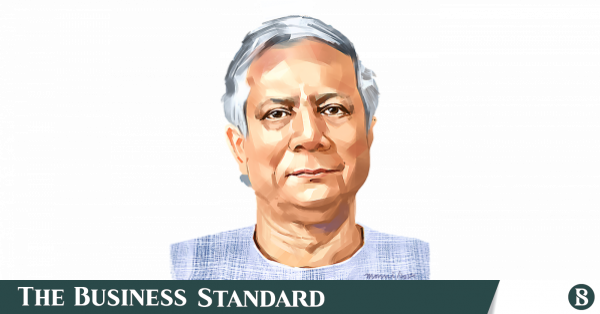“They are as free as anybody else to participate,” he was quoted as saying by TIME. “We’ll fight them on political grounds.”
Chief Adviser Professor Muhammad Yunus of the Bangladesh interim government. Sketch: TBS
“>

Chief Adviser Professor Muhammad Yunus of the Bangladesh interim government. Sketch: TBS
The Awami League will be welcome to contest elections once those responsible for killings and abuses are held accountable, Chief Adviser Muhammad Yunus was quoted as saying by US magazine TIME.
He also said everyone will receive a fair trial.
“They are as free as anybody else to participate,” he was quoted as saying by TIME in an article titled “Muhammad Yunus on the Race to Build Bangladesh 2.0” published on the magazine’s website today (21 November). “We’ll fight them on political grounds.”
Speaking to TIME, Yunus also criticised the ousted AL regime.
“The previous government created this environment of total oppression, denial of everything, killing at random, disappearance of people, destroying every single institution,” he said. “It was a fascist regime.”
Earlier in an interview with The Hindu on 18 November, Yunus said the interim government has no objection to Awami League contesting the polls.
Asked if the AL will be allowed in polls, he told The Hindu, “We didn’t want to take decisions about the political party, and the BNP has done that saying that all political parties must contest elections. So, they already made the verdict, and we cannot defy the opinion of a major party of the country.”
Speaking to TIME, the chief adviser also addressed the issue of seeking AL President and former prime minister Sheikh Hasina’s extradition from India, where she is residing presently.
“Yunus revealed that he would be seeking Hasina’s extradition after prosecutors issued a warrant for her part in the violence, though few believe Indian Prime Minister Narendra Modi would comply,” reads the article.
“Not only is she being hosted by India, the worst part is that she’s talking, which causes a lot of problems for us,” it said quoting Yunus. “It makes people very unhappy to hear that voice. So this is something that we have to resolve.”
Yunus also spoke about the change in US administration with Donald Trump’s recent victory in the presidential election and the changes it could bring in the relations between Bangladesh and the US.
The TIME article states that Yunus is confident that he can find common ground with the president-elect despite their divergent worldviews. “Trump is a businessman; we are in business,” he says. “We are not asking for free money to help us out of some crisis; we want a business partner.”
Speaking about the political parties’ demand for a roadmap to elections, Yunus told TIME that he has not fixed any date to that end.
“I don’t have a date. “First we have to fix the rails so that the train goes in the right direction,” he is quoted as saying.
Speaking about recapturing some of the reported billions of dollars that the Awami League has siphoned out of the country, Yunus told TIME that European Commission President Ursula von der Leyen has offered to share the bloc’s mechanisms for rooting out corruption in aspirant members. “Every country that we talk to has offered support to get the money back,” says Yunus. “They have done it before in other situations.”
The TIME article also writes that “Awami League members that remain in Bangladesh say they are being subjected to collective punishment.”
Quoting Zahid Maleque, who served as health minister until January, the article states he dares not surrender to court to answer conspiracy charges as he suffers from a heart condition and believes he’d be refused bail. “My passport has been cancelled, my family bank account has been frozen,” he tells TIME from hiding. “I’m a sick man. I’ve not seen my family for four months.”
“The purge has spread beyond party bigwigs. Across Dhaka, influential citizens who once flaunted their connections to the Awami League are now minimizing any ties, fearful they could be weaponized by business rivals,” TIME writes.
Human-rights groups have also raised alarm that journalists perceived as sympathetic to Hasina have been stripped of their press credentials and at least 25 charged with crimes against humanity related to the violence.
“Media professionals are bearing the brunt of the need for vengeance,” Antoine Bernard, director of advocacy and assistance for Reporters Without Borders, said in a statement. “The interim authorities … must do everything in their power to end this vicious process.


